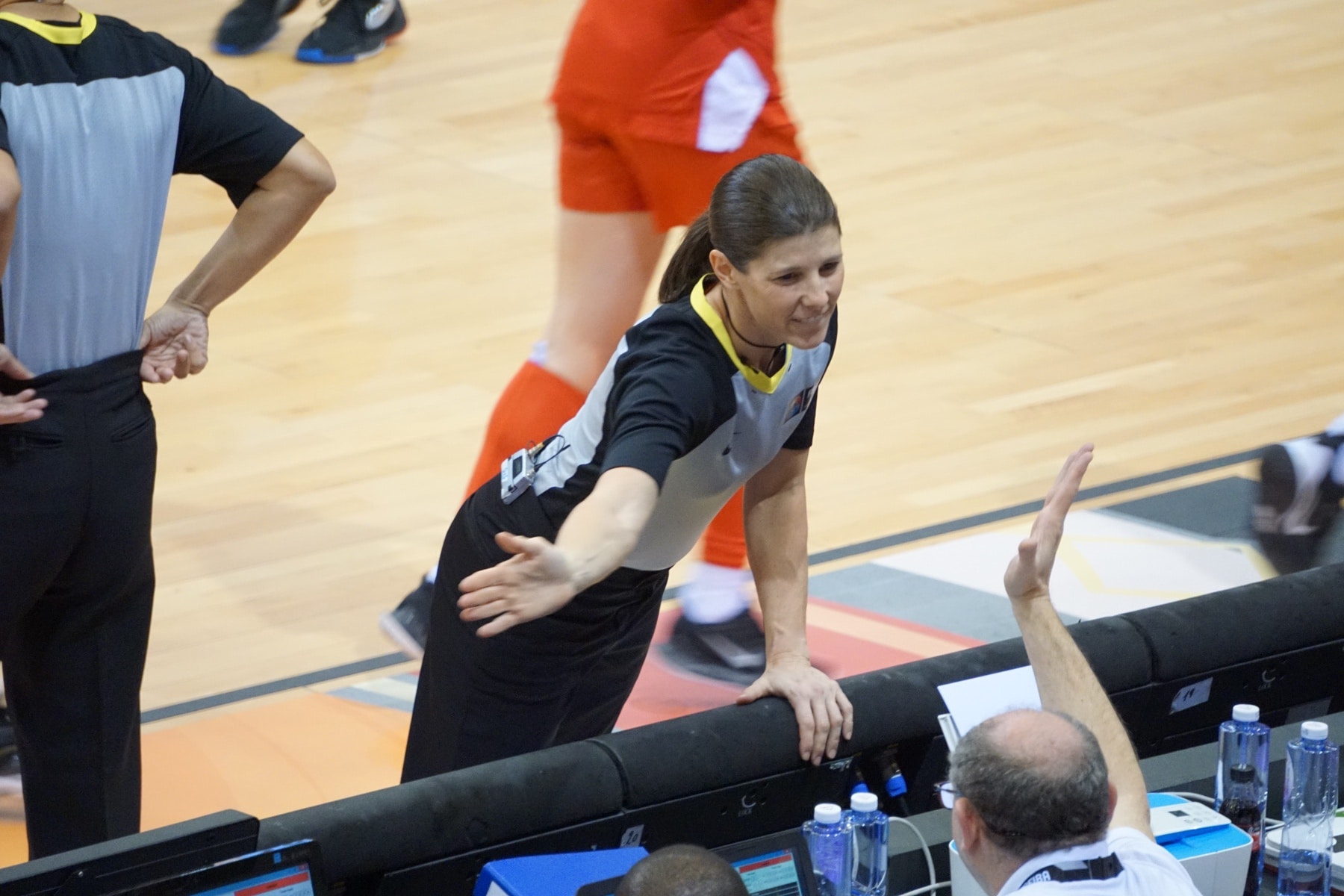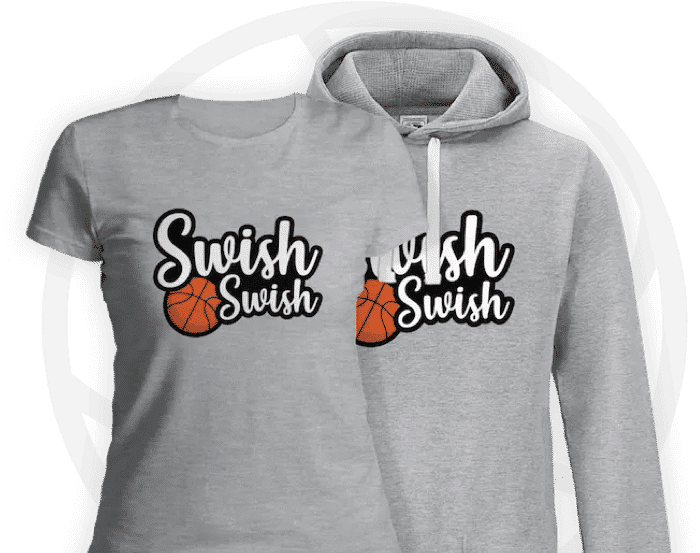While working on our piece about refereeing in the WNBA, we had the pleasure to ask a few questions to Amy Bonner, a professional referee who has been officiating in the WNBA, the G-League, the NCAAW and FIBA competitions.
A fascinating talk which enlightened us about the reality of the job of a professional referee.

Let’s start by talking about you. A simple question to start with: how did you get the urge to become a referee ?
When I was studying at the University I needed to make some extra money without taking on a full-time job. My studies for a degree in Physical Therapy and my training schedule for the Track and Field team made it impossible to have a full time job. A teammate’s dad suggested we referee on the weekends. I loved playing basketball so it seemed like a natural fit. I started working recreational leagues on campus and local middle school games. Once I graduated and finished my internships, a friend who assigned officials to a high school league asked if I wanted to work some games. It started as a hobby but quickly became a passion.

Let’s talk more specifically about the WNBA: what path did you follow to become a referee in the WNBA and the G-League ? What are the steps ?
Everyone takes a different path to the G-League/WNBA/NBA. Today it is more structured and a more defined path. When I started there was a bit of luck involved as far as being seen and identified as potential candidate. Most of us were working NCAA basketball before we started in the professional leagues. I worked a college game with an official who was also in the WNBA. She felt I had potential and recommended I be invited to training camp. The next spring I received a call to participate in my first professional training.After the first training I was invited to the NBA Summer league, this was back around 2002. From that training experience I was then hired into the NBDL, National Basketball Development League, which is now called the G-League. In 2005, after three seasons in the NBDL, I was hired into the WNBA.
Today the road to working professional games has really developed into a more systematic process. The League has scouts watching games all over the country to identify talented young referees that they think have the potential to develop into professional referees. Those officials are invited to summer training events and if they perform well they advance through the levels over a course of 2-3 summers. It starts with what is called Grassroots camp, then Mid-level and finally Elite Camp.These clinics consist of progressive training, each level offering more advanced concepts covering all aspects of officiating. Officials spend time in the classroom studying videos, the rules, the role of communication, as well as working games and being evaluated on the court. They are rated on rules knowledge, fitness, understanding of the system we use to define areas of responsibility during live play, communication and of course play call accuracy. There are many intangibles that are evaluated as well. How you recover from a mistake in a game, how you receive critical feedback, can you make adjustments, do you handle off the court responsibilities with professionalism? These clinics are lead by current G-League, WNBA and NBA officials as well as the Directors of Referee Development for all three leagues. The top candidates at Elite camp are identified, evaluated and then either hired into the G-League, slated to return to camp the next year or unfortunately released from the program. After working in the G league officials are evaluated for their potential to be hired into the WNBA or NBA; some may go to the WNBA and then into the NBA.

A more practical question: how does a game day go in the WNBA from the referee’s point of view ? What is your typical schedule ?
We typically arrive in the host city the night before the game. We have a “day of game” meeting sometime in the morning to discuss the match ups, any potential issues, current rule interpretations and how we want to handle any special situations during the game. Most of us do some sort of light workout to get our bodies loose and ready after traveling the day before. Often we will have lunch together, then return to the hotel to prepare individually. I like to review one section of the rule book or case book (a set of interpretations for specific rule situations) then have a short nap before we leave. We arrive at the arena 75-90 minutes prior to the tip off. Once at the arena it is a busy time. We check the instant replay system, have a meeting with the security team, possibly the TV crew if it is a nationally televised game. We change into our uniform, warm up, stretch and discuss any last thoughts about the game. After the game in the locker room we review any plays we think may be “pertinent” to the outcome of the game, for example a game deciding call, a decision that lead to a technical foul, any unsportsmanlike plays. We submit those in a game report that goes to the league office. We also receive a copy of the game video for personal evaluation individually. Usually I wait a day then “break down” or review every play, assessing accuracy, positioning, court presence and an exchanges with coaches/players to analyze how I could have handled a situation in a better way. If you are not willing to be honest in evaluating yourself you will never get better and you will not remain in the league very long. Just like the players we are constantly trying to find ways to improve.
A question that may seem a little candid but I wonder how you and your colleagues decide who is where on the field ? Who is going to throw the ball at the tip-off ? Is it a rock, paper and scissors decision ?
HA HA…. it is much more formal that that. We are assigned our positions by the league and it can vary from game to game. This is true in NCAA, FIBA and the professional leagues. One official on each game is designated as the Crew Chief. Typically they are the most experienced official on the crew. The Crew Chief is responsible for contacting the crew, preparing and leading the pregame meetings and writing the post game report. In FIBA games the Crew Chief tosses the ball to start the game, in NCAA and the NBA system any member of the crew can toss the ball, whoever has the best technique. On the court the Crew Chief is responsible for leading the video review process and they communicate with the production crew to get the replay angles we need. If there is a question about a rule application or the outcome after replay they make the final decision after taking the other’s information into consideration. During live play, they do not have “more power” than the other officials to make calls, meaning they cannot overrule another official just because they are the crew chief. We have a system we use to designate which referee covers areas of the court and how we move up and down the court with the players. The system is similar for NCAA, FIBA and the WNBA with a few differences. The goal is to position the referees in the best way to correctly evaluate each type of play.

There’s been a lot of talk about the salaries in the WNBA and I was wondering if that also applies to the referees : is there a financial difference if you whistle a G-League game or a WNBA game ?
The officials in all three leagues belong to a union called the NBRA, National Basketball Referee Association. Each league has a separate collective bargaining agreement which sets the work conditions for each league. This includes travel policies, benefits, work rules and of course game fees. It is not unlike most work places where your pay rate increases with your experience. Each league has it’s own pay scale but the WNBA and G-League are similar.
How do you organize your schedule between international games and games on the American soil ? The WNBA season only lasts a few months, do you work before and after ?
This is quite a challenge. By trade I am a physical therapist and early in my officiating career I was able to work lower level college games and hold a position as a physical therapist. Eventually I made the decision that officiating is my passion and I committed to it full time. Officiating is my full time job.
The NCAA season runs from November to April. We are given our assignments in September for the entire regular season. The GL goes from November to about May. These assignments come month by month. We have a calendar we post our assigned games to and the schedulers work from that. The WNBA, as you know, starts in May and finishes in October.With the WNBA being in the summer, all the W officials also officiate in the winter. Some work NCAA basketball (women’s or men’s), some work the G-League since it also runs from Nov-April and some do all three, working the G-League and NCAA during the winter and continue right into the WNBA in the summer. In addition to the games there are training camps we are either required to attend, NBA Summer League for example, or we may be instructors for NCAA clinics. International tournaments add an additional level of scheduling !
The NBA (including the WNBA and GL) has a great relationship with FIBA . This includes the officiating programs, so when there is an opportunity to work an international tournament the schedulers for the NBA/W/GL are very supportive and work our schedule around those tournaments.
You have the opportunity to officiate men games in G-League, women games in the WNBA but also international games with FIBA. What are the differences between all these games in terms of refereeing ? And between American and European basketball ?
Each league has it’s own personality and culture. Style of play is different between the three but Illegal contact is still illegal contact and the criteria for what is legal or illegal is very similar across the different games. The G-League has what we call early offense…they cross into the front court and are immediately looking to score; Either a quick 3 point shot, a hard drive to the basket or a quick pass into the post. You have to be ready immediately with your positioning and transition. The WNBA is more technical, more screening, passing and development of plays which means it requires a lot of effort to get open angles to see a play clearly. International games are high energy, with the ball constantly moving as well as the players; all the time, all over the place! Each has it’s challenges and requires a different mental preparation. I love the challenge of working between the different leagues it keeps me on my toes for sure !!!

Can you share with us one (or some) of your best memories of refereeing in the WNBA ? Are there any players who always gave you a hard time on the court ? And players with whom you developed a good work relationship ?
I have so many great memories working the WNBA and GL it’s hard to pick one or two. I would say the first time I refereed in “The Garden” in New York City was a memorable experience. Recognizing the history of not just basketball but all sports in Madison Square Garden and realizing you are now a part of that history is pretty humbling. Working my first Final and working my first Game 5 were great highlights. The atmosphere was so intense! I love being a part of the high intensity games!!
One of the great things about professional basketball are the relationships you develop. Players are in the league longer, there are fewer teams than NCAA, and the officiating staff is small, less than 40 officials in the W, so you really get to know each others personalities. Some players are much more intense on the court and some are more even in their temperament but they are all highly competitive. Diana Taurasi is probably the most intense and competitive player I have ever officiated. Her ferocity can be hard to handle, especially for younger officials, but that intensity has made me a better official. I have respect for her work ethic and her passion to not only win but be the best. Becky Hammon was a great leader on the floor, passionate and intense, but you could go to her and have an honest discussion about any game situation. Sue Bird is the same. I respect so many of the players in the WNBA. They are not getting paid millions of dollars, their motivation and the drive to excel comes from within. They play for the love of the game and they carry the responsibility of being roles models to young girls with great respect and care.
We officiate for the same reason and I think this gets overlooked. We do it for the love of the game as well and we are all what I would consider high achievers, setting goals and demanding excellence from ourselves. Most of the officials I know played college sports before officiating. You may not realize it but we are as competitive as the players!!!! Put a group of referees into teams and watch out…it doesn’t matter if we are playing a checkers, a card game or a sport we are out for blood!!! HA HA. Our competition as a referee is now the video tape. We are trying to “beat the video” and get every call right. We never will have a perfect game but we strive for that every night.

Did people like Violet Palmer, the first woman to officiate in NBA, or other pioneers, inspire you ?
Of Course both Violet Palmer and Dee Kantner are inspirational!!! Chantal Julien is another female referee that had kicked doors open! Chantal was working men’s professional basketball in Europe in 1995, just before Dee and Violet came into the NBA. These women didn’t just “get in” they got in and proved women can be highly successful officials at any level of basketball and now many professional sports. They continue today to set the standard in their roles as mentors, supervisors and instructors. There are so many others that have also inspired me and continue to inspire me but I would be negligent if I did not also mention June Courteau in this group of amazing women. June was a pioneer in women’s officiating who inspired me with her work ethic, her passion and her desire to constantly learn and adapt in efforts to make officials better. Without this group being so successful many of us would not have have the opportunities we have today.
For their efforts and success I am grateful.I try to take something from each of their styles as I mentor and help instruct young referees starting out today
Gratitude to Amy Bonner for her amazing willingness to share her experience with the readers of Swish Swish.
This interview would not have been possible without the help of Karine Cramazou et Chantal Julien. Many thanks to both of you.
And last but not least, thanks to Shaï Mamou for helping with the translation and Damien Buono for his talent as a photographer.




Pingback:
Pingback:
Pingback:
Pingback:
Pingback:
Pingback:
Pingback:
Pingback:
Pingback:
Pingback:
Pingback:
Pingback:
Pingback:
Pingback:
Pingback:
Pingback:
Pingback:
Pingback:
Pingback:
Pingback:
Pingback:
Pingback:
Pingback:
Pingback:
Pingback:
Pingback:
Pingback:
Pingback:
Pingback:
Pingback:
Pingback:
Pingback:
Pingback:
Pingback:
Pingback:
Pingback:
Pingback:
Pingback:
Pingback:
Pingback:
Pingback:
Pingback:
Pingback:
Pingback:
Pingback:
Pingback:
Pingback:
Pingback:
Pingback:
Pingback:
Pingback:
Pingback:
Pingback:
Pingback:
Pingback:
Pingback:
Pingback:
Pingback:
Pingback:
Pingback:
Pingback:
Pingback:
Pingback:
Pingback:
Pingback:
Pingback:
Pingback:
Pingback:
Pingback:
Pingback:
Pingback:
Pingback:
Pingback:
Pingback: